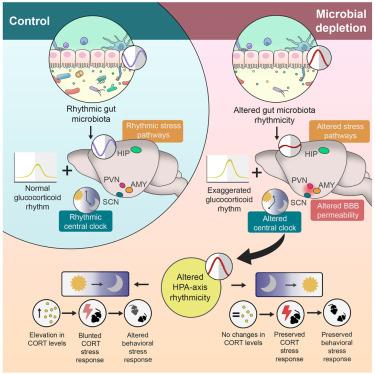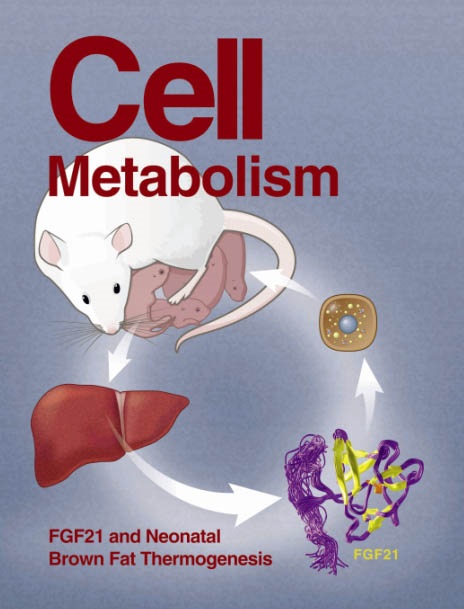Gut microbiota regulates stress responsivity via the circadian system
IF 27.7
1区 生物学
Q1 CELL BIOLOGY
引用次数: 0
Abstract
Stress and circadian systems are interconnected through the hypothalamic-pituitary-adrenal (HPA) axis to maintain responses to external stimuli. Yet, the mechanisms of how such signals are orchestrated remain unknown. Here, we uncover the gut microbiota as a regulator of HPA-axis rhythmicity. Microbial depletion disturbs the brain transcriptome and metabolome in stress-responding pathways in the hippocampus and amygdala across the day. This is coupled with a dysregulation of the circadian pacemaker in the brain that results in perturbed glucocorticoid rhythmicity. The resulting hyper-activation of the HPA axis at the sleep/wake transition drives time-of-day-specific impairments of the stress response and stress-sensitive behaviors. Finally, microbiota transplantation confirmed that diurnal oscillations of gut microbes underlie altered glucocorticoid secretion and that L. reuteri is a candidate strain for such effects. Our data offer compelling evidence that the microbiota regulates stress responsiveness in a circadian manner and is necessary to respond adaptively to stressors throughout the day.

肠道微生物群通过昼夜节律系统调节压力反应性
压力和昼夜节律系统通过下丘脑-垂体-肾上腺(HPA)轴相互联系,以维持对外部刺激的反应。然而,这些信号的协调机制仍不为人知。在这里,我们发现肠道微生物群是 HPA 轴节律性的调节器。微生物耗竭会扰乱大脑海马体和杏仁核应激反应通路的全天转录组和代谢组。再加上大脑昼夜节律起搏器失调,导致糖皮质激素节律紊乱。由此导致的睡眠/觉醒转换期 HPA 轴过度激活,推动了特定时间段的应激反应和应激敏感行为障碍。最后,微生物群移植证实,肠道微生物的昼夜振荡是改变糖皮质激素分泌的基础,而L. reuteri是产生这种效应的候选菌株。我们的数据提供了令人信服的证据,表明微生物群以昼夜节律的方式调节应激反应能力,并且是全天对应激源做出适应性反应的必要条件。
本文章由计算机程序翻译,如有差异,请以英文原文为准。
求助全文
约1分钟内获得全文
求助全文
来源期刊

Cell metabolism
生物-内分泌学与代谢
CiteScore
48.60
自引率
1.40%
发文量
173
审稿时长
2.5 months
期刊介绍:
Cell Metabolism is a top research journal established in 2005 that focuses on publishing original and impactful papers in the field of metabolic research.It covers a wide range of topics including diabetes, obesity, cardiovascular biology, aging and stress responses, circadian biology, and many others.
Cell Metabolism aims to contribute to the advancement of metabolic research by providing a platform for the publication and dissemination of high-quality research and thought-provoking articles.
 求助内容:
求助内容: 应助结果提醒方式:
应助结果提醒方式:


